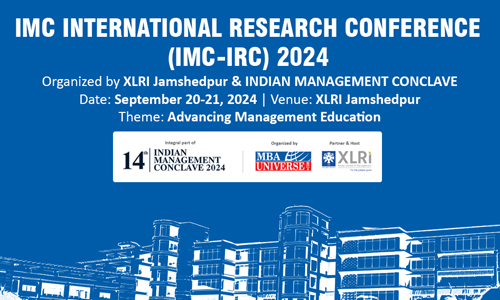Theme 2024: Identifying Contemporary Roles & Competencies for Reshaping MBA Program
The annual theme of IMC Conclave is based on an overarching multi-year mega-theme. Guided by the first multiyear theme calling for improvement in key B-school processes, at the 12th edition of International Management Conference (IMC) 2022, we concluded a series of six annual IMC Conclaves on following sequential themes: MBA Program Objective, Curriculum, Pedagogy, Faculty Development, Learner Centricity and Outcome assessment.
From the 13th IMC 2023, we embarked on a new voyage. In response to the unprecedented changes in how business is done today, the theme for the 13th IMC 2023 was ‘Business Value Creation in the Age of Disruption’. Speaking at IMC 2023, thought-leaders and CXOs, representing more than 20 large MBA recruiters, unanimously agreed that leveraging technology effectively is one of the key drivers of creating business value today. CXOs also pointed out to several unmet expectations from the fresh MBA graduates.
Top Sectors Recruiting MBAs have changed dramatically
A big insight from recent MBA recruitment data is that just three sectors hire more than 80% of all MBA graduates from Top 50 Indian B-schools. These sectors are: Global Capability Centers (GCC) & IT Services, Consulting and Banking & Financial Services. Refer table 1 for sector wise breakup.
Table 1: Top Sectors Recruiting MBAs from Top 50 B-schools in 2023 & 2024
|
Industry
|
Share of Total MBA Jobs Offered
|
|
IT Services
|
33.9 %
|
|
Consulting
|
25.5 %
|
|
Banking & Financial Services
|
24.8 %
|
|
Internet Businesses
|
3.7 %
|
|
IT Software
|
3.4 %
|
|
Diversified & Others
|
8.7 %
|
|
Total
|
100.0 %
|
Source: MBAUniverse.com Analysis of B-school Placement Reports 2024 & 2023
The deliberations at IMC 2023 raised following questions:
• What are the expectations of MBA recruiters, particularly from the IT, Consulting, BFSI Sectors?
• Are they being met? If not, what are the gaps?
• What are the structural initiatives required by B-schools to meet these expectations?
The answers to these questions can create the right backdrop for reshaping the MBA program to make it more relevant for contemporary business practices.
MBA Placement Trends 2024: Urgent Call for Action
MBA Placement 2024 season was unlike any other in the last decade. MBAUniverse.com Analysis of B-school Placement Reports 2024 reveals that MBA salaries have fallen this year compared to last year. Refer table 2. Further, the percentage of MBA graduates who were left unemployed on the date of completion of their MBA program was at a record high. Many B-schools had to reach out to their Alumni, and also hire external placement agencies for support.
Table 2: MBA Salaries Stagnant or Decline, even in Top B-schools
|
B-school
|
Average Salary 2023 (Rs. in Lakhs)
|
Average Salary 2024 (Rs. in Lakhs)
|
Increase/ Decrease (%)
|
|
IIM Bangalore
|
35.31
|
35.92
|
+1.7%
|
|
IIM Calcutta
|
35.07
|
35.07
|
0%
|
|
IIM Ahmedabad
|
34.45
|
Audited report to be released in Oct 2024
|
|
|
XLRI Jamshedpur
|
32.70
|
29.89
|
-9% Drop
|
|
SPJIMR Mumbai
|
33.02
|
33.00
|
0%
|
|
MDI Gurgaon
|
27.67
|
25.50
|
-8% Drop
|
|
IIM Lucknow
|
32.20
|
30.00
|
-7% Drop
|
|
IIM Kozhikode
|
31.02
|
28.05
|
-10% Drop
|
|
IIM Indore
|
30.21
|
25.68
|
-15% Drop
|
|
SJMSoM IIT Bombay
|
28.88
|
28.01
|
-3% Drop
|
Source: MBAUniverse.com Analysis of B-school Placement Reports 2024
The data presented in table 2 must be seen in the context of a stable Indian economy and growing corporate sales. If this was a Covid year of 2020-21 or a Lehman-crisis of 2007-8, one could understand the challenge faced for placements.
The fall in placements call for a systematic investigation. As the rules of Business Value Creation in the Age of Disruption change, have industry expectations from MBA graduates also changed? Is there a disconnect between Industry’s talent expectations and the output of B-schools? Looking at the recent recruitment trends, it seems so…
Changing Managerial Competencies Requirements of Industry
Widespread usage of generative Artificial Intelligence (AI) and the impact of COVID-19 have changed the way business is done (Donthu & Gustafsson, 2020; McKinsey, 2023). Consequently, the required managerial competencies, which positively influence the performance of both individuals and their organisations, have also undergone a significant change.
A study on the impact of AI on managerial competencies revealed that most managerial skills, such as complex decision-making, innovation, and relationships, will be augmented by AI, while some skills like simple decision-making will be completely replaced by AI tools (Giraud et al., 2022). Studies have found a significant impact of COVID-19 on traditional managerial competencies that include interpersonal, intrapersonal and cognitive competencies (Agnihotri & Misra, 2022). A recent study identified key competencies required by US and Indian industry experts. The study highlighted execution, innovation, and technological competencies as the most important for managerial performance in the post COVID-19 world (Agnihotri and Misra, 2023; World Economic Forum, 2023).
Table 3: Key managerial competencies identified by the US & Indian Industry Experts
|
Competencies
|
Importance Scores
(Mean) by Indian Experts (Ratings out of 5)
|
Importance Scores (Mean) by US Experts
(Ratings out of 5)
|
|
Self-awareness
|
4.77
|
N/A
|
|
Execution
|
4.49
|
3.58
|
|
Social-awareness
|
4.35
|
3.66
|
|
Relationship Management
|
4.28
|
3.60
|
|
Self-Management
|
4.27
|
4.20
|
|
Cognitive Intelligence
|
4.22
|
3.63
|
|
Technology awareness, use, development
|
4.11
|
N/A
|
|
Technical knowledge
|
4.08
|
3.42
|
|
Innovation
|
3.80
|
3.39
|
Source: Agnihotri, A., & Misra, R. K. (2023). Managerial competencies: A comparative study of US‐India employer’s needs. Global Business and Organizational Excellence.
While business education is expected to develop the required competencies in MBA graduates (AACSB 2020, Standards 4.1), studies in the US and European countries have found gaps between the competencies possessed by MBA graduates and the competencies desired by the industry (Datar et al., 2011; Lešer & Berginc, 2023; Pereira et al., 2019, Osmani et al., 2019). A recent study, based on the perceptions of employees from 285 European companies, found that MBA students lacked interpersonal, leadership, and entrepreneurial skills (Lešer & Berginc, 2023). Studies in India too have found gaps in ‘soft skills’ of MBA graduates (Dhiman & Sharma, 2019).
As the following section describes, recruiters are now hiring MBAs for Specific Roles, not Management Trainees. Hence, new studies are required to assess if MBA graduates possess the required “role-specific competencies” for that industry.
Recruiters seek MBAs for Specific Roles, not Management Trainees
A decade back, most corporates hired MBAs primarily as ‘Management Trainees’ or Trainees in different business functions. During their on-job training, which often lasted for 12-18 months, fresh MBAs were given exposure to different business verticals and functions, and based on their performance and interest, were assigned a specific job role in the company.
As the rules of business value creation in today’s age of disruption change, MBA hiring approach has also changed. Today, large MBA recruiters, particularly from the IT, Consulting and Banking & Financial Services, expect to hire MBA graduates directly for specific job roles. These job roles have defined responsibilities and expectations that measure how an employee contributes to corporate objectives. Hence, after a short company orientation that often lasts a week, these fresh MBAs are expected to start contributing in their designated roles.
MBAUniverse.com Analysis of B-school Placement 2024 data from a few large B-schools in North, West and South India corroborates this point. The data, presented in table 4-6, suggests that majority of MBA jobs, offered by large recruiters in IT, Consulting and BFSI sectors at these B-schools, were for well-defined specific roles. Data also reveals that generic roles such as ‘Management Trainee’ were a minority of the total jobs.
An important trend observed is that more specific Job roles attracted higher pay packages and richer job descriptions. These job roles were offered either at B-schools with good reputations, as seen in Table 4 below. Whereas the same employer offered different set of job roles in the tier 2 B-schools, as shown in tables 6 below.
Table 4: Top Sectors & Job Roles Offered in 2024 at a leading South India based B-school
|
Sector
|
% Placements
|
Top Roles Offered
|
Total Number of Offers
|
|
IT Sector
|
38.7%
|
Business Analyst
|
15
|
|
BFSI
|
34.6%
|
Credit Strategy Analyst
|
17
|
|
Consulting
|
23.6%
|
Techno-functional Consultant
|
17
|
|
|
|
Pre-Sales Consultant
|
13
|
Source: Respective B-school shared data with MBAUniverse.com
Table 5: Top Sectors & Job Roles Offered in 2024 at a leading West India based B-school
|
Sector
|
% Placements
|
Top Roles Offered
|
Total Number of Offers
| |
|
IT Sector
|
16 %
|
Senior Analyst
|
19
| |
|
BFSI
|
50%
|
Wholesale Credit Risk, Risk Information Services, Market Risk, Control Functions
|
13
| |
|
Consulting
|
16 %
|
Consultant
|
25
| |
|
Manufacturing
|
5%
|
Account Manager
|
9
| |
Source: Respective B-school shared data with MBAUniverse.com
Table 6: Top Sectors & Job Roles Offered in 2024 at a leading West India based B-school
|
Sector
|
% Placements
|
Top Roles Offered
|
Total Number of Offers
|
|
IT Sector
|
6.29%
|
Management Trainee – Shared Services
|
8
|
|
BFSI
|
41%
|
Analyst Program
|
24
|
|
Consulting
|
19.76%
|
Tax Consultant
|
36
|
|
Consumer Goods
|
15.21%
|
Sales Officer
|
34
|
Source: Respective B-school shared data with MBAUniverse.com
Call for Identifying Contemporary MBA Roles & Competencies
Looking at the above business and recruitment trends, progressive B-schools should consider how they can reshape their MBA programs to meet the contemporary industry requirements. A careful analysis of following questions shall be useful for embarking on this path:
• What are the expectations of key recruiters from MBA graduates?
• Are they hiring MBAs for Specific Roles? If yes, which Roles?
• What are the required Competencies and Skills for these Roles?
To deliberate on above questions, the theme for fourteenth edition of Indian Management Conclave (IMC) 2024 is ‘Identifying Contemporary Roles & Competencies for Reshaping MBA Program’. To deliberate on this theme, IMC Conclave shall host following sessions:
|
Session
|
Session Objective & Topic
|
Speakers/ Presenters
|
|
Inaugural & Valedictory
|
Understanding Contemporary MBA Roles, and the required Competencies & Skills by corporates
|
Business Leaders
|
|
Plenary Sessions
|
To learn from the Industry about Contemporary MBA Roles, and the required Competencies & Skills
|
CXOs from top MBA recruiting sectors such as IT & GCCs, Consulting, BFSI and other related sectors
|
|
Academic Leaders’ Roundtable
|
To discuss how B-schools can meet the changing industry requirements from their MBA graduates
|
Directors from Top B-schools
|
|
IMC Awards for Excellence in Management Education
|
Share initiatives taken by progressive B-schools to identify MBA Roles and develop the required Competencies
|
Academic Leaders representing B-schools where these initiatives have been taken
|
IMC Research Conference to promote cutting edge research on management education
As management education faces unprecedented challenges, and some opportunities, few avenues for promoting quality research exist. To bridge this gap, we have initiated IMC International Research Conference (IMC-IRC) as an integral part of IMC Conclave. IMC IRC will solely focus to promote quality research for advancing management education. Hence, the theme for IMC-IRC is ‘Advancing Management Education’. About 50 papers will be presented on following tracks:
• Track 1: Advancing Management Education for Sustainable Development
• Track 2: Teaching Methodologies & Pedagogical Innovation in Management Education
• Track 3. Academic Processes, Quality Assurance, & Outcome Assessment
• Track 4: Competencies for Employability, Career Advancement, & Entrepreneurship
• Track 5: Entrepreneurship Development through Management Education
• Track 6 - Artificial Intelligence (AI) & Digital Technologies: Leveraging for
• Management Education
We expect that Directors, Deans and Decision-makers will glean insights from these presentations, and leverage them for the benefit of their institutions.
Conclave curators and authors of this paper await deliberations during the above sessions. We also invite feedback and suggestion from the participants for designing the theme and topics for the next year’s Conclave. Please email us at: [email protected]
| Dr SR Singhvi, Management Consultant & Advisor; Former Senior Faculty, IIM Indore & MDI Gurgaon | Mr Amit Agnihotri, Founder, INDIAN MANAGEMENT CONCLAVE & MBAUniverse.com |
References
AACSB. (2020). Guiding Principles and Standards for Business Accreditation.
Retrieved from https://www.aacsb.edu/-/media/documents/accreditation/business/standards-and-tables/2020-business-accreditation-standards.pdf. Accessed February 6, 2024
Agnihotri, A., & Misra, R. K. (2023). Managerial competencies: A comparative study of US‐India employer’s needs. Global Business and Organizational Excellence, 43(2), 92–106. https://doi.org/10.1002/joe.22221
Agnihotri, A., & Misra, R. K. (2024). Are top Business Schools in India assessing contemporary managerial competencies required by industry during MBA selection process? The International Journal of Management Education. DOI: 10.1016/j.ijme.2024.101032
Agnihotri, A., & Misra, R. K. (2022). Emotional & technological impact on managerial competencies: outlining the development agenda. Development and Learning in Organizations: An International Journal. http://dx.doi.org/10.1108/dlo-05-2022-0083
Datar, S. M., Garvin, D. A., & Cullen, P. G. (2011). Rethinking the MBA: business education at a crossroads. Journal of Management Development, 30(5), 451–462. https://doi.org/10.1108/02621711111132966
Dhiman, A., Sharma, M. (2019). Recruiters’ perceptions about MBA graduates and management education at top tier management institutes in Indian context. Indian Institute of Management Calcutta Working Paper WPS No. 820/January, 2019
Donthu,N., & Gustafsson,A. (2020). Effects of COVID-19 on business and research. Journal of Business Research, 117, 284–289. https://doi.org/10.1016/j.jbusres.2020.06.008
Giraud, L., Zaher, A., Hernandez, S., & Akram, A. A. (2022, June 13). The impacts of artificial intelligence on managerial skills. Journal of Decision Systems, 32(3), 566–599. https://doi.org/10.1080/12460125.2022.2069537
Lešer, V. J., Berginc, D. (2023). Analysis of MBA Skills from the Employer’s Perspective: A Case Study. Advances in Business-Related Scientific Research Journal, Vol. 14(1), 45-57
McKinsey (2023). The state of AI in 2023: Generative AI’s breakout year.
Retrieved from https://www.mckinsey.com/capabilities/quantumblack/our-insights/the-state-of-ai-in-2023-generative-ais-breakout-year#/. Accessed February 10, 2024
Pereira, E. T., Vilas-Boas, M., & Rebelo, C. C. (2019, June 3). Graduates’ skills and employability: the view of students from different European countries. Higher Education, Skills and Work-Based Learning, 9(4), 758–774. https://doi.org/10.1108/heswbl-10-2018-0098
World Economic Forum (2023). Future of Jobs Report 2023.
Retrieved from https://www3.weforum.org/docs/WEF_Future_of_Jobs_2023.pdf. Accessed January 15, 2024

Announcing Speakers: Policy Makers, Business Leaders, CXOs, Top Academic Leaders, Journal Editors and Top Researchers

IMC International Research Conference 2024: Check Theme, Tracks, Paper Submission Guidelines, Participating Institutions/Authors.

IMC Delegate Registration Open: Decision-makers, Academics from B-schools and Representatives from Corporate Houses, Education Service Providers can register now.